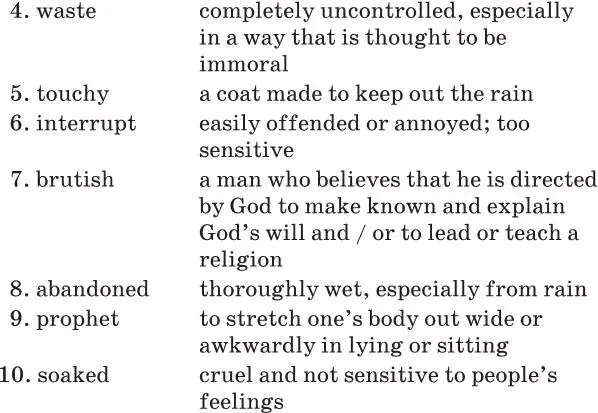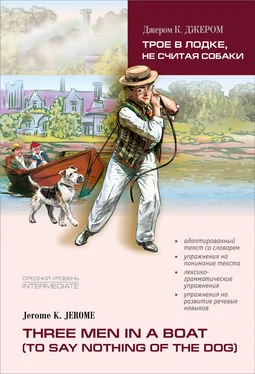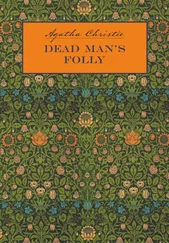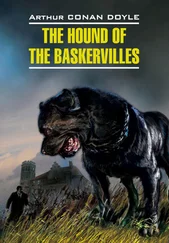“Are you all right, sir?” said the man.
“Right it is,” we answered; and with Harris at the sculls and I at the tiller-lines, and Montmorency, unhappy and deeply suspicious, in the prow 80 80 Harris at the sculls and I at the tiller-lines, and Montmorency, unhappy and deeply suspicious, in the prow – Харрис на веслах, я у руля, и несчастный, полный подозрений Монморанси на носу лодки
, we started our travel on to the waters which, for a fortnight, were to be our home.
Exercises
1. Read the chapter and mark the sentences T (true), F (false) or NI (no information).
1. The narrator was going to get up at 9 o’clock.
2. George was still sleeping when his friends woke up.
3. Montmorency ate chops and cold beef for breakfast.
4. The narrator considers weather forecasts to be very useful.
5. The narrator had a good time staying in a hotel in Oxford.
6. We usually prefer people who prophesy good weather, even if their words don’t prove correct.
7. The friends gathered quite a small crowd to help them with the luggage.
8. There wasn’t any timetable at Waterloo station.
9. The friends had to pay an engine-driver to get to Kingston.
10. George was deeply suspicious at the beginning of the sea trip.
2. Learn the words from the text:
fortnight, interrupt, waste, instead of, weather forecast, occasional, beforehand, meanwhile, wonder, pay attention to, circumstance, afterwards, rumour, on the contrary, beg, convinced, suspicious, prove, grocer, starve.
3. Practice the pronunciation of the following words.
4. Fill in the gaps using the words from the text.
1. It … Mrs. Poppets … woke me up next morning.
2. If I … … you, you’d … lain there for the whole fortnight.
3. He … have been up … himself with eggs and bacon or … the dog instead … sprawling there.
4. We told him that he … have … go without shaving that morning, as we … going to unpack that bag again for him.
5. Montmorency … … two other dogs to come and see him, and they … whiling away the time by … on the doorstep.
6. And so, finding that he … not disappoint us, and … only … his time, he … the cigarette that I … carefully rolled up for …, and … .
7. There … a melon by itself in a bag, because it was … bulky … go in anywhere.
8. … this time, quite a small crowd … collected, and people … asking each … what … the matter.
9. The porter … took our things thought it … go from number two platform, while another porter … heard a rumour that it … … from number one.
10. We learnt … the train we … come by was really the Exeter mail, and that they had … hours at Waterloo, looking … it, and nobody … what … become of it.
5. Match the words with definitions.

6. Find in the text the English equivalents for:
прогноз погоды, мне интересно (почему…), вместо того (чтобы), поздняя осень, обращать внимание на, местная газета, оставаться дома, тратить драгоценное время, сказать наверняка, проспать, знать заранее, злиться на кого-то.
7. Find the words in the text for which the following are synonyms:
respond, foretell, annoying, soaked, obtain, apparently, ordinary, decide, cry, extremely.
8. Explain and expand on the following.
1. It was Mrs. Poppets that woke me up next morning.
2. I do think that this “weather-forecast” fraud is about the most annoying.
3. The barometer is useless: it is as misleading as the newspaper forecast.
4. But who wants to be foretold the weather?
5. Then Harris and I carried out our luggage on to the doorstep, and waited for a cab.
6. By this time, quite a small crowd had collected.
7. Nobody at Waterloo ever knows where a train is going to start from.
8. We learnt, afterwards, that the train we had come by was really the Exeter mail.
9. Answer the following questions.
1. Did the friends wake up at the time they planned? Why / why not?
2. Why did Harris and the narrator decide to save George?
3. What is the narrator’s attitude to weather forecasts? Why?
4. How did the narrator and his friends spend the holiday he recollects about?
5. What does the narrator think about barometers and weather foretelling?
6. What show did the street boys get interested in? Who was the first?
7. What kind of people Biggs’s boys usually were?
8. Did the friends face any problem at Waterloo station? What was it?
9. How did the friends get to Kingston?
10. Was Montmorency happy to start the journey?
10. Retell the chapter for the persons of the narrator, Biggs’s boy, George, Harris, Montmorency.
It was a wonderful morning, late spring or early summer, as you care to take it 81 81 as you care to take it – как вам больше нравится
. The attractive streets of Kingston, where they came down to the water’s edge, looked quite picturesque in the flashing sunlight, the river with its barges, the neat villas on the other side, Harris, in a red and orange blazer, grunting away at the sculls 82 82 grunting away at the sculls – кряхтящий на веслах
, the distant glimpses of the grey old palace of the Tudors 83 83 the Tudors – Тюдоры – королевская династия Англии в 1485–1604 гг.
, all made a sunny picture, so bright but calm, so full of life, and yet so peaceful.
I thought about Kingston, or “Kyningestun,” as it was once called in the days when Saxon kings were crowned there. Great Caesar crossed the river Thames there, and the Roman legions camped upon its hills. Caesar like Elizabeth, some years later, seems to have stopped everywhere: only he didn’t stay at the public houses.
The English Queen was crazy about public houses. There’s hardly a pub within ten miles of London that she does not seem to have looked in, or stopped at, or slept at, some time or other. I wonder now, supposing Harris became a great and good man, and got to be Prime Minister, and died, if they would put up signs over the public houses that he had visited: “Harris had a glass of beer in this house;” “Harris had two glasses of Scotch whisky here in the summer of ’88;” “Harris was thrown away from here in December, 1886.”
No, there would be too many of them! The houses that he had never entered would become famous. “The only house in South London that Harris never had a drink in!” The people would rush to it to see what could have been the matter with it.
Saxon kings were crowned in Kingston but then its greatness passed away for a time, to rise once more when Hampton Court 84 84 Hampton Court – Хэмптон-Корт – бывшая загородная резиденция английских королей.
became the palace of the Tudors and the Stuarts 85 85 the Stuarts – Стюарты – королевская династия Шотландии, Англии, Ирландии и Великобритании в 1371–1714 гг.
. Many of the old houses speak of those days when Kingston was a royal town, and nobles and courtiers lived there, near their King, and the long road to the palace gates was cheerful all day with clanking steel and rustling silks and velvets, and fair faces. The spacious houses, with their large windows, their huge fireplaces, and their gabled roofs 86 86 spacious houses, with their large windows, their huge fireplaces, and their gabled roofs – просторные дома с большими окнами, огромными каминами и остроконечными крышами
were constructed in the days “when men knew how to build.” The hard red bricks have only become more firm with time, and their oak stairs do not creak and grunt when you try to go down them quietly.
Читать дальше













